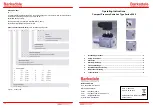
– 379 –
G
LOSSARY
ACL
Access Control List. ACLs can limit network traffic and restrict access to
certain users or devices by checking each packet for certain IP or MAC (i.e.,
Layer 2) information.
BOOTP
Boot Protocol. BOOTP i
s
used to provide bootup information for network
devices, including IP address information, the address of the TFTP server
that contains the devices system files, and the name of the boot file.
C
O
S
Class of Service is supported by prioritizing packets based on the required
level of service, and then placing them in the appropriate output queue.
Data is transmitted from the queues using weighted round-robin service to
enforce priority service and prevent blockage of lower-level queues.
Priority may be set according to the port default, the packet’s priority bit
(in the VLAN tag), TCP/UDP port number, IP Precedence bit, or DSCP
priority bit.
D
IFF
S
ERV
Differentiated Services provides quality of service on large networks by
employing a well-defined set of building blocks from which a variety of
aggregate forwarding behaviors may be built. Each packet carries
information (DS byte) used by each hop to give it a particular forwarding
treatment, or per-hop behavior, at each network node.
DiffServ
allocates
different levels of service to users on the network with mechanisms such as
traffic meters, shapers/droppers, packet markers at the boundaries of the
network.
DHCP
Dynamic Host Control Protocol. Provides a framework for passing
configuration information to hosts on a TCP/IP network. DHCP is based on
the Bootstrap Protocol (BOOTP), adding the capability of automatic
allocation of reusable network addresses and additional configuration
options.
DHCP O
PTION
82
A relay option for sending information about the requesting client (or an
intermediate relay agent) in the DHCP request packets forwarded by the
switch and in reply packets sent back from the DHCP server. This
information can be used by DHCP servers to assign fixed IP addresses, or
set other services or policies for clients.
DNS
Domain Name Service. A system used for translating host names for
network nodes into IP addresses.
Summary of Contents for 8028L2
Page 1: ...MANAGEMENT GUIDE TigerSwitchTM 10 100 1000 28 Port Gigabit Ethernet Switch SMC8028L2 ...
Page 6: ...ABOUT THIS GUIDE 6 ...
Page 22: ...FIGURES 22 ...
Page 26: ...SECTION Getting Started 26 ...
Page 46: ...CHAPTER 2 Initial Switch Configuration Managing System Files 46 ...
Page 48: ...SECTION Web Configuration 48 ...
Page 144: ...CHAPTER 4 Configuring the Switch Configuring DHCP Relay and Option 82 Information 144 ...
Page 184: ...CHAPTER 6 Performing Basic Diagnostics Running Cable Diagnostics 184 ...
Page 238: ...CHAPTER 12 Port Commands 238 ...
Page 244: ...CHAPTER 13 Link Aggregation Commands 244 ...
Page 262: ...CHAPTER 15 RSTP Commands 262 ...
Page 272: ...CHAPTER 16 IEEE 802 1X Commands 272 ...
Page 282: ...CHAPTER 17 IGMP Commands 282 ...
Page 290: ...CHAPTER 18 LLDP Commands 290 ...
Page 296: ...CHAPTER 19 MAC Commands 296 ...
Page 306: ...CHAPTER 21 PVLAN Commands 306 ...
Page 318: ...CHAPTER 22 QoS Commands 318 ...
Page 352: ...CHAPTER 26 SNMP Commands 352 ...
Page 355: ...CHAPTER 27 HTTPS Commands 355 EXAMPLE HTTPS redirect enable HTTPS ...
Page 356: ...CHAPTER 27 HTTPS Commands 356 ...
Page 362: ...CHAPTER 29 UPnP Commands 362 ...
Page 370: ...CHAPTER 31 Firmware Commands 370 ...
Page 372: ...SECTION Appendices 372 ...
Page 386: ...GLOSSARY 386 ...
Page 391: ...INDEX 391 ...
Page 392: ...149100000079A R01 SMC8028L2 ...














































